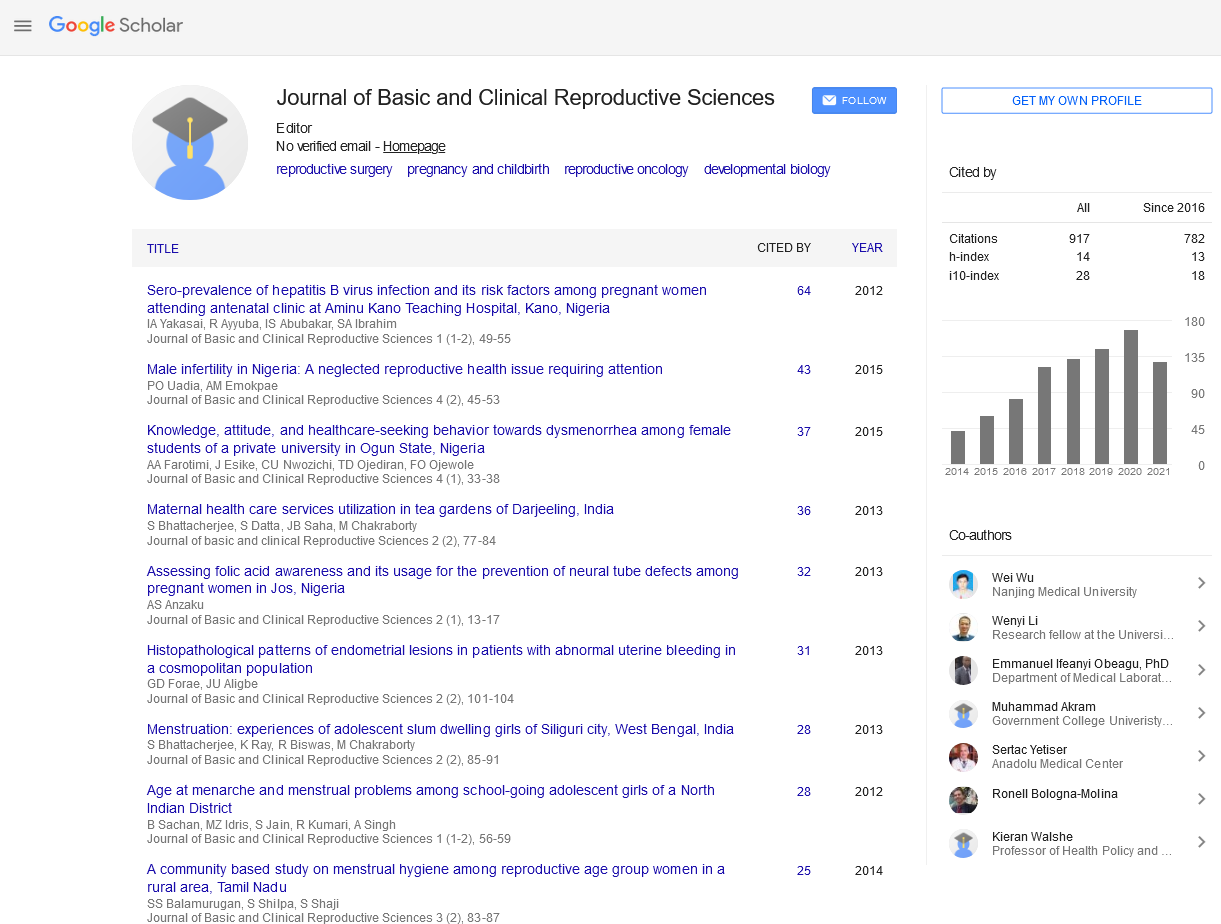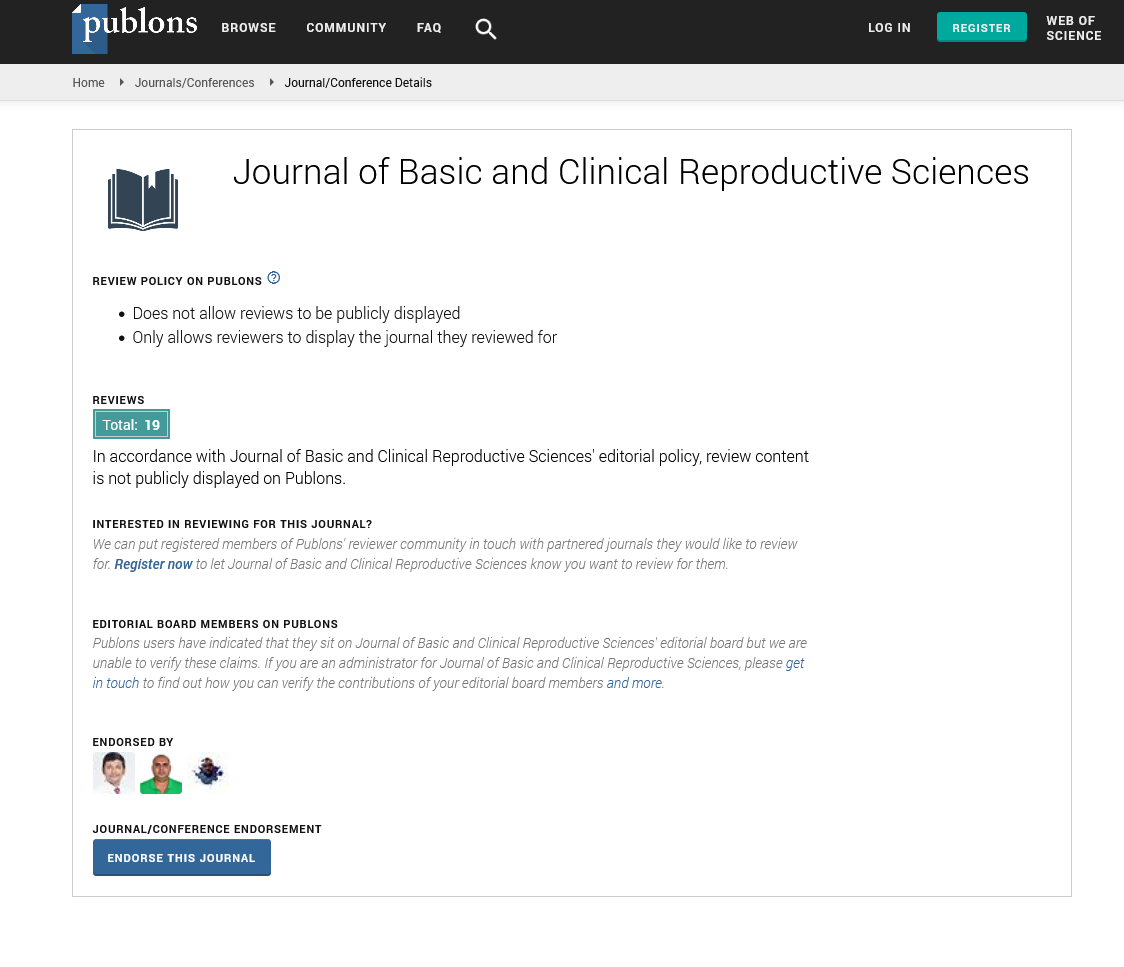Opinion - Journal of Basic and Clinical Reproductive Sciences (2023) Volume 12, Issue 4
Metabolic and Hormonal Dysregulation in Poly Cystic Ovary Syndrome (PCOS)
Received: 31-Jul-2023, Manuscript No. JBCRS-23-114415 ; Editor assigned: 02-Aug-2023, Pre QC No. JBCRS-23-114415 (PQ); Reviewed: 16-Aug-2023 QC No. JBCRS-23-114415 ; Revised: 23-Aug-2023, Manuscript No. JBCRS-23-114415 (R); Published: 30-Aug-2023
This open-access article is distributed under the terms of the Creative Commons Attribution Non-Commercial License (CC BY-NC) (http://creativecommons.org/licenses/by-nc/4.0/), which permits reuse, distribution and reproduction of the article, provided that the original work is properly cited and the reuse is restricted to noncommercial purposes. For commercial reuse, contact reprints@pulsus.com
Description
Poly Cystic Ovary Syndrome (PCOS) is a common endocrine disorder affecting individuals with reproductive and metabolic implications. Poly Cystic Ovary Syndrome (PCOS) is a multifaceted endocrine disorder that affects people of reproductive age, particularly those with female sex characteristics. It is characterized by a range of hormonal imbalances and metabolic disturbances, often resulting in irregular menstruation, ovarian cysts, and an increased risk of various health complications. PCOS has gained significant attention in recent years due to its high prevalence and potential long-term health implications. PCOS is defined by a combination of clinical, biochemical, and imaging criteria. Elevated insulin levels contribute to insulin resistance, leading to increased androgen production and disrupted ovarian function. Abnormalities in hormones Like Luteinizing Hormone (LH), Follicle-Stimulating Hormone (FSH), and Sex Hormone-Binding Globulin (SHBG) play a role in PCOS. PCOS frequently leads to irregular menstrual cycles, ranging from oligomenorrhea to amenorrhea. Irregular menstruation can have implications for both reproductive health and overall well-being. Pregnant individuals with PCOS should receive specialized prenatal care to monitor and manage potential complications. This may include blood sugar monitoring, dietary adjustments, and close monitoring of blood pressure. Hyperandrogenism includes excess hair growth, acne, and male-pattern baldness. Elevated levels of androgens or clinical signs such as hirsutism and acne. Insulin resistance often leads to obesity, metabolic syndrome, and an increased risk of type 2 diabetes. Polycystic ovaries are the enlarged ovaries with multiple small cysts. Visualized through ultrasound as the presence of multiple small follicles within the ovaries.
Management and treatment
Adopting a balanced, low-glycemic-index diet can help regulate insulin levels, reduce weight, and improve metabolic health in women with PCOS. Reducing the consumption of processed foods, sugars, and refined carbohydrates is often recommended. Regular physical activity, such as aerobic exercise and strength training, can improve insulin sensitivity, assist in weight management, and reduce the severity of PCOS symptoms. Achieving and maintaining a healthy weight is often a key component of managing PCOS, as weight loss can significantly improve Birth control pills are commonly prescribed to regulate menstrual cycle. Drugs like spironolactone may be prescribed to those trying to conceive, medications like this insulin-sensitizing medication can help manage insulin resistance and improve metabolic health in some cases. For individuals with PCOS who are struggling with infertility, Assisted Reproductive Technologies (ART) such As In Vitro Fertilization (IVF) may be recommended. In rare cases, surgery called ovarian drilling may be considered for women with PCOS who do not respond to other treatments. This involves making small holes in the ovaries to reduce androgen production and improve fertility. Some individuals with PCOS may benefit from supplements such as inositol, which has shown promise in improving insulin sensitivity and menstrual regularity. Counselling or support groups can help individuals with PCOS manage the emotional and psychological aspects of the condition, particularly if they are dealing with issues like body image concerns or depression. Long-term management of PCOS typically involves regular check-ups with healthcare providers to monitor symptoms, hormonal levels, and overall health.
Conclusion
Polycystic Ovary Syndrome is a complex endocrine disorder that affects many aspects of a person’s health, from reproductive function to metabolic well-being. Early diagnosis and a multidisciplinary approach to management are crucial for minimizing the long-term health risks associated with PCOS. Further research into the underlying mechanisms and tailored treatment options will continue to improve the lives of individuals living with this condition. Polycystic Ovary Syndrome (PCOS) exerts a profound influence on reproductive health, affecting fertility, menstrual regularity, and pregnancy outcomes. While PCOS can present challenges, timely diagnosis and appropriate management strategies can help individuals with PCOS achieve their reproductive goals. Collaborative care between gynecologists, endocrinologists, and fertility specialists is essential to address the multifaceted nature of PCOS and optimize reproductive health.


